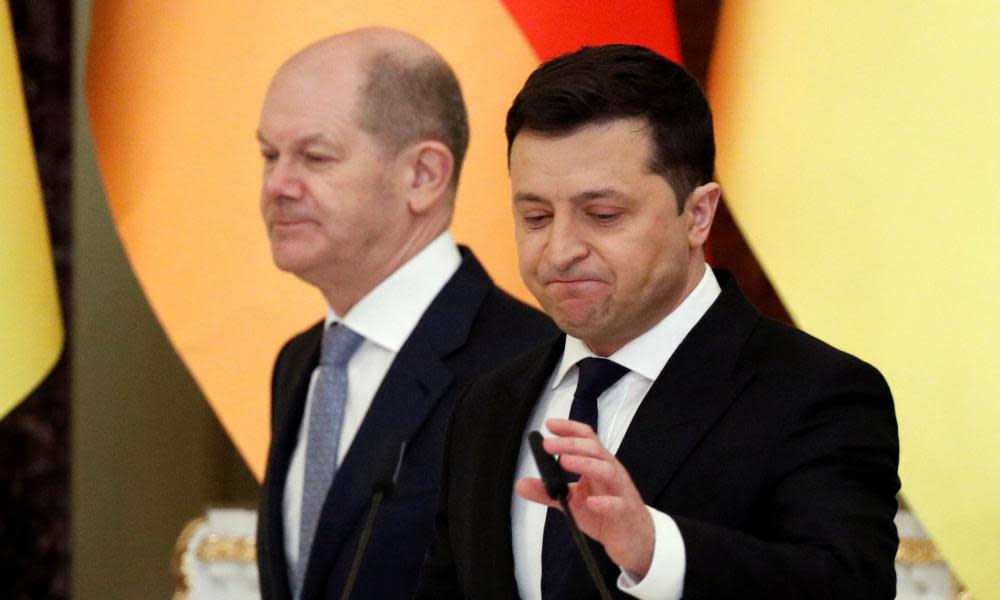Zelenskiy invites Germany’s Scholz to visit Ukraine on Russia’s Victory Day

President says visit on 9 May, when German leaders have often travelled to Moscow, would make powerful statement
Ukraine’s president, Volodymyr Zelenskiy, has urged the German chancellor, Olaf Scholz, to make a powerful political statement by visiting Kyiv on 9 May, the day German leaders have often travelled to Moscow to mark Russia’s Victory Day, a memorial to the 27 million Russians killed in the second world war.
The invitation to Scholz and the German president, Frank-Walter Steinmeier, follows weeks of intense Ukrainian criticism of Germany over its reluctance to supply weapons or support an EU-wide embargo on Russian energy imports. Germany is especially dependent on Russia for gas and says it would suffer more from an embargo than Russia.
Without mentioning Germany specifically, Zelenskiy said: “Even now there are some people who want to get some oxygen without even attempting to breathe. They want to strike a balance. They want to be in the grey area, stay in the shadow, or to be walking in between the drops of rain. But there are no drops any more. It is pouring and everyone is soaking wet.”
Speaking to the the British thinktank Chatham House, Zelenskiy offered to hold talks with Russia if it returned to the territory it held inside Ukraine before the 24 February invasion. He said the offer would be withdrawn if Ukrainian military or civilians were attacked during the evacuation of Mariupol.
“If Russia kills civilians or soldiers who could be released, we cannot conduct diplomatic negotiations with them,” Zelenskiy said.
He repeated Ukrainian claims that the Russians were preparing a victory parade in the long besieged city on 9 May, but added: “Mariupol will never fall, and I’m not talking about heroism, but there is nothing left to fall apart, it is already devastated and has no structure.”
Ukrainian officials accused Russia of violating a ceasefire on Friday aimed at evacuating scores of civilians trapped in a bombed-out steelworks in Mariupol.
The city has endured the most destructive siege of the 10-week-old war, and the sprawling Soviet-era Azovstal plant is the last part of it still in the hands of Ukrainian fighters.
Ukraine’s military said Russia was continuing a blockade of its fighters in the plant. There are thought to be about 200 Ukrainian soldiers still fighting, many of them determined to die rather than surrender.
UN-brokered evacuations of some of the hundreds of civilians who had taken shelter in the plant’s network of tunnels and bunkers began last weekend but were halted in recent days by renewed fighting.
The head of Ukraine’s presidential staff, Andriy Yermak, said the next stage of the rescue had started on Friday, but Mariupol authorities said Russian forces had fired at a car that was involved, killing one Ukrainian fighter and wounding six.
Captain Sviatoslav Palamar, the deputy commander of the Azov regiment, pleaded on Ukrainian TV for the evacuation of civilians and wounded fighters from the steelworks, saying soldiers were “dying in agony due to the lack of proper treatment”.
Scholz is due to make a nationwide television address on 8 May, and to speak to fellow G7 leaders by video. He previously angered Ukraine when he said he would not visit while Steinmeier – a longtime advocate of closer relations with Russia – was banned from visiting Kyiv. Zelenskiy spoke to Steinmeier on Thursday to offer him a visit.
EU officials are in the process of delaying the date by which all EU states will be required to impose an oil embargo from Russia, owing to objections from Hungary and Slovakia.
Zelenskiy said Ukraine could block the Russian advance when it had the necessary equipment and refused to be drawn on the wider military implications if Mariupol finally fell. Ukrainian forces have in effect lost access to the port, and its fall would allow Russia to establish a land corridor to the Crimean peninsula, which it seized from Ukraine in 2014, and free up troops to fight elsewhere in the Donbas, the eastern industrial region that the Kremlin says is now its chief objective.
Zelenskiy urged the west to do more to bring those responsible for war crimes to justice more quickly. “Russian leaders believe responsibility can be postponed for decades if it ever comes,” he said. Russia he said believed it had impunity because “they have the power of the nuclear state and the nuclear blackmail”.
A senior official from the Russian parliament said on Friday that Russia would remain in southern Ukraine “for ever”. Speaking on a visit to the Moscow-controlled city of Kherson, Andrey Turchak said: “There should be no doubt about this. There will be no return to the past. We will live together, develop this rich region, rich in historical heritage, rich in the people who live here.”
Turchak announced the opening of a humanitarian aid centre in Kherson for the delivery of food, medicine and other essentials. It was the first time a senior Russian official had indicated Moscow’s intention to remain present on Ukrainian territory.
Western officials are confident that Vladimir Putin will not use his 9 May address – to which no foreign leader has been invited – to announce a general mobilisation since it would be likely to provoke a political backlash.

 Yahoo News
Yahoo News 
